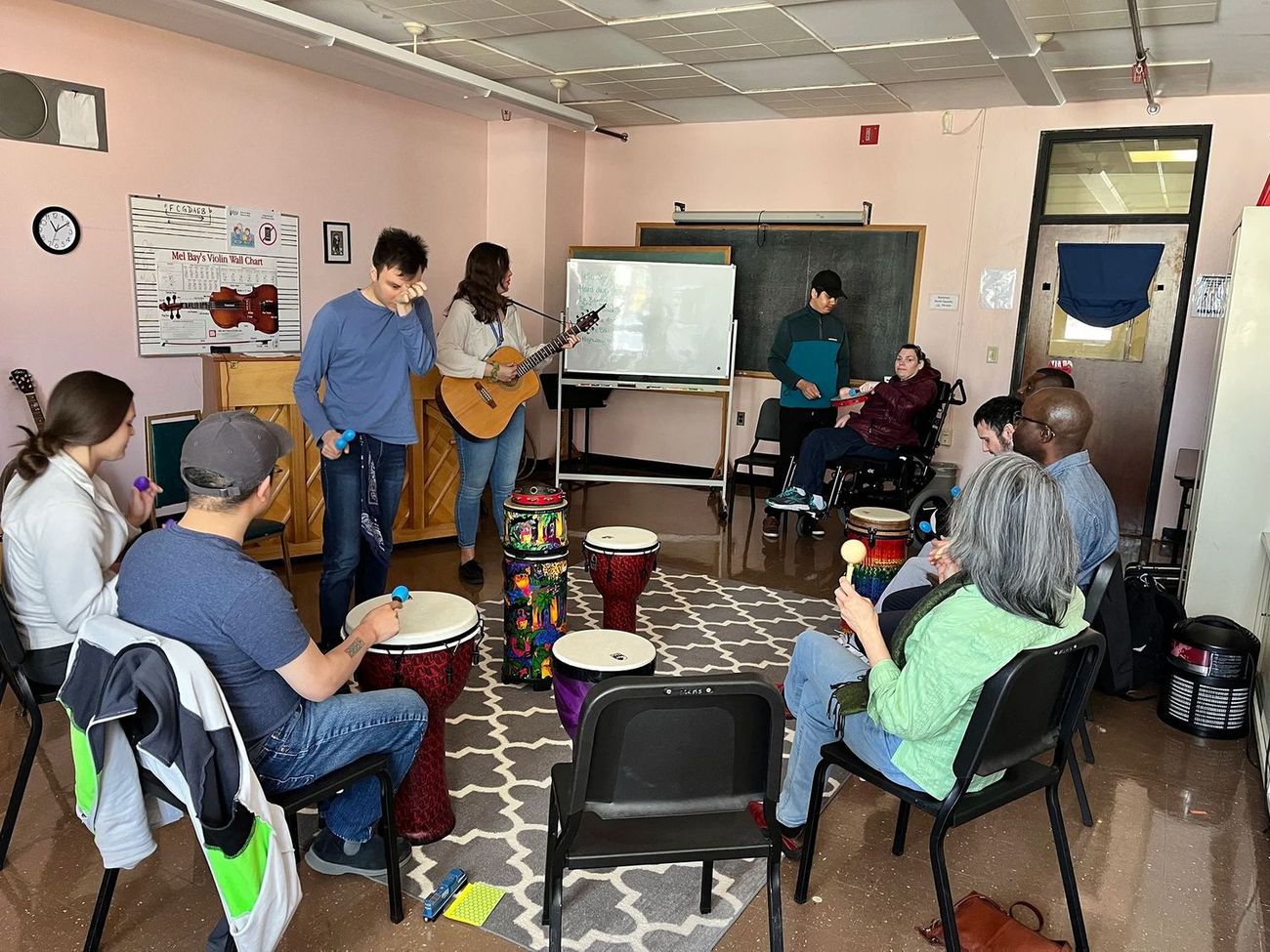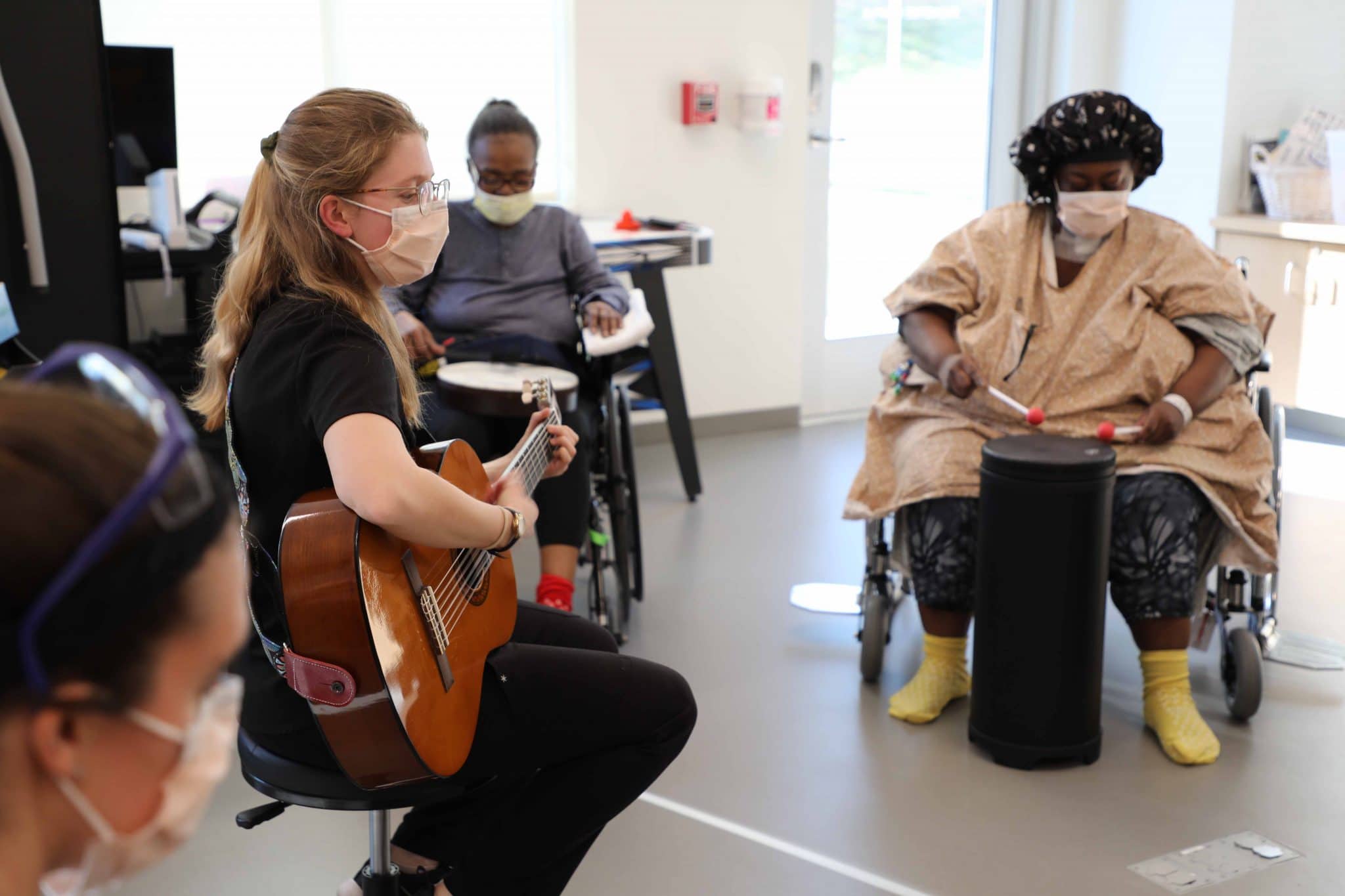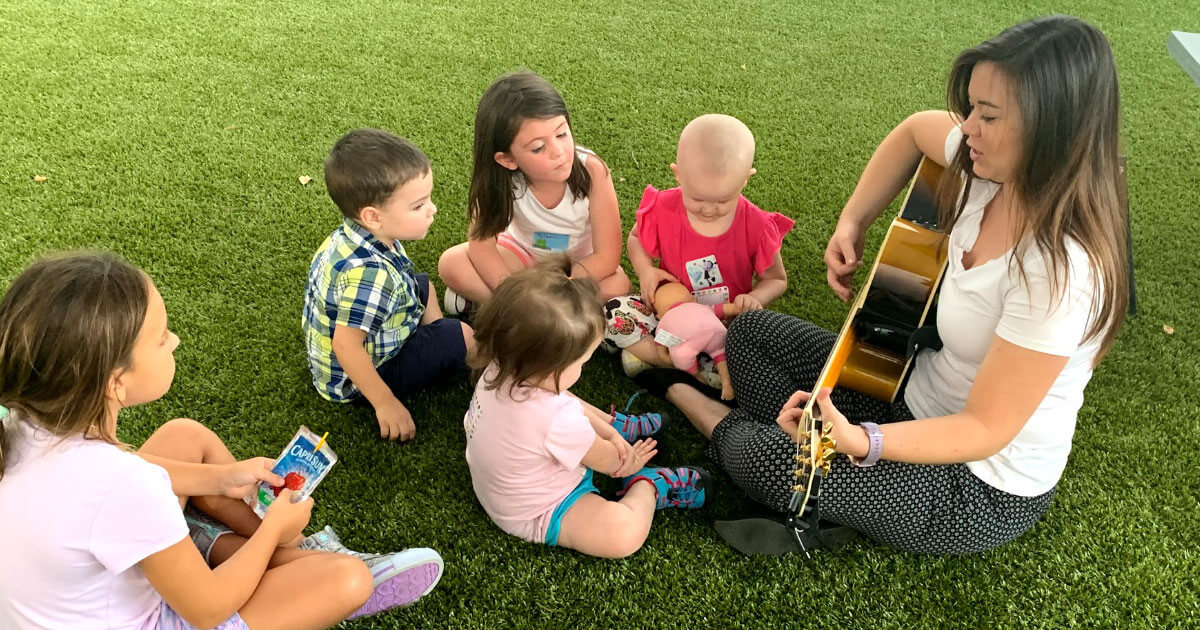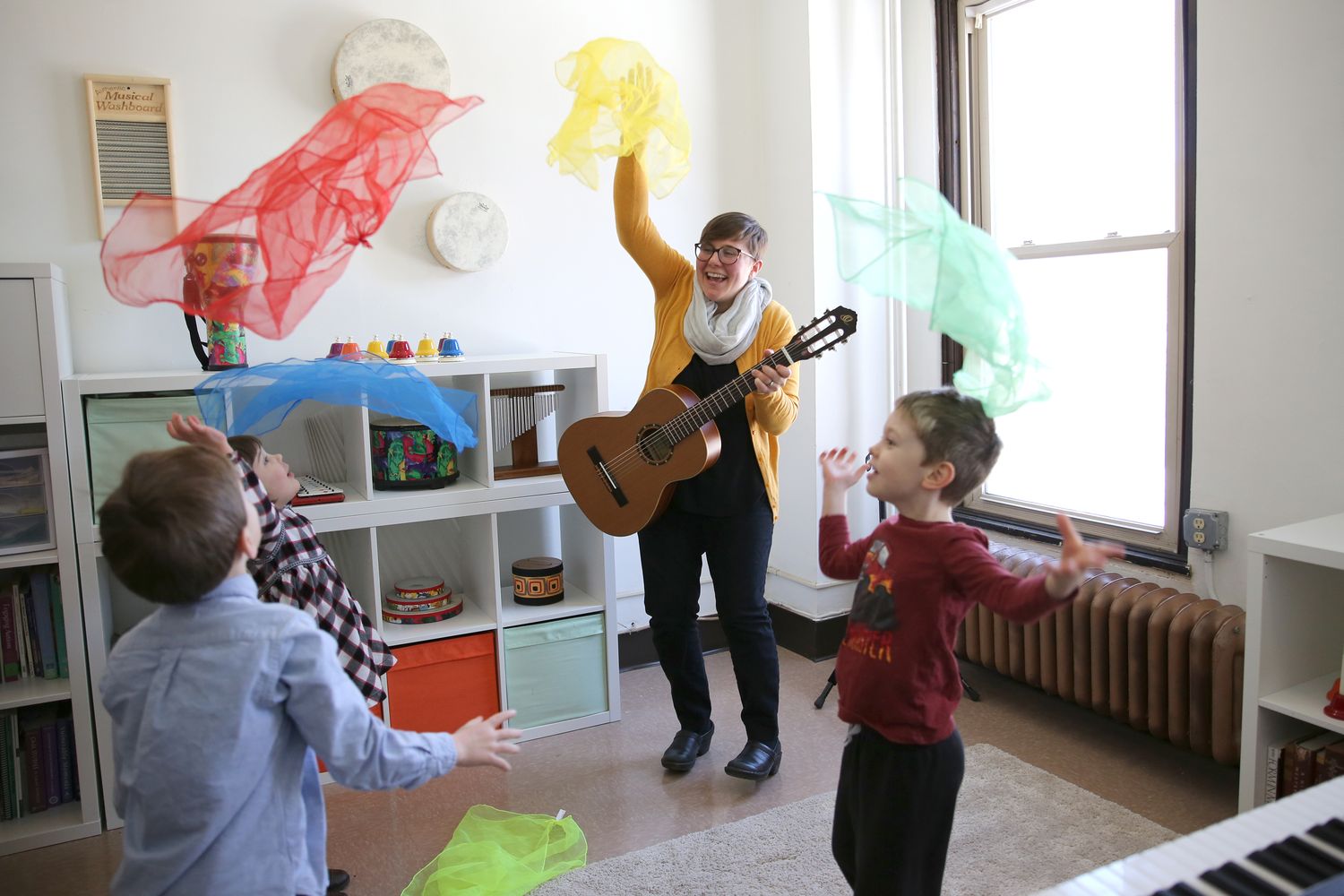Home>Events & Info>Music Therapy>How To Do Music Therapy For Teens


Music Therapy
How To Do Music Therapy For Teens
Published: February 2, 2024
Learn how to implement effective music therapy techniques for teenagers in this comprehensive guide. Discover the benefits of music therapy and its positive impact on mental health.
(Many of the links in this article redirect to a specific reviewed product. Your purchase of these products through affiliate links helps to generate commission for AudioLover.com, at no extra cost. Learn more)
Table of Contents
- Introduction
- Understanding Music Therapy
- Benefits of Music Therapy for Teens
- Choosing the Right Music Therapist
- Setting up a Music Therapy Session
- Techniques Used in Music Therapy
- Creating a Safe and Supportive Environment
- Guided Music Listening
- Songwriting and Lyric Analysis
- Improvisation and Musical Play
- Therapeutic Music Performance
- Evaluating the Progress
- Conclusion
Introduction
Music has the power to touch our souls, evoke emotions, and create a sense of connection. It has long been recognized as a universal language that transcends cultural and linguistic barriers. But did you know that music can also be a powerful tool for healing? This is where music therapy comes in.
Music therapy is a holistic approach that uses music to address physical, emotional, cognitive, and social needs of individuals. It is a field of healthcare that combines the art and science of music to promote overall well-being. Music therapy interventions are tailored to meet the unique needs of each individual, making it a versatile and flexible therapeutic modality.
When it comes to teenagers, who are navigating the complexities of adolescence and facing a wide range of challenges, music therapy can be particularly beneficial. Adolescence is a time of self-discovery, identity formation, and emotional growth. Music offers a non-threatening and expressive medium for teenagers to explore their emotions, build self-esteem, enhance communication skills, and develop coping strategies.
In this article, we will delve deeper into the world of music therapy for teens. We will explore the benefits of music therapy for teenagers, how to choose the right music therapist, the techniques used in music therapy sessions, and more. Whether you are a parent, a healthcare professional, or a teenager yourself, this article will provide you with valuable insights and guidance on incorporating music therapy into your life.
Understanding Music Therapy
Music therapy is a specialized form of therapy that utilizes music to address the physical, emotional, cognitive, and social needs of individuals. It is a recognized healthcare profession that is based on clinical and evidence-based practices. Music therapists use their knowledge of music and its therapeutic qualities to design interventions that aim to improve the well-being of their clients.
Music therapy sessions are conducted by trained and certified music therapists who have a deep understanding of the therapeutic benefits that music can provide. They work with clients of all ages, including teenagers, to help them achieve their therapeutic goals through music-based interventions.
Music therapy interventions can take various forms, depending on the needs and preferences of the teenager. These can include listening to and discussing music, playing musical instruments, singing, songwriting, improvisation, and movement to music. The therapist and the teenager work collaboratively to select and engage in activities that are meaningful and relevant to the teenager’s unique needs.
It’s important to note that music therapy is different from music education or music lessons. While music education focuses on teaching musical skills and knowledge, music therapy is centered around using music as a therapeutic tool to promote healing and growth. In music therapy, the focus is on the process and the emotional response that the music elicits, rather than the musical performance itself.
Music has the ability to tap into our emotions and create a profound impact on our well-being. It can evoke memories, provide comfort, reduce stress, and facilitate self-expression. In the context of music therapy for teens, it can help them explore and express their emotions, develop coping skills, improve communication and social skills, build self-esteem, and enhance overall emotional well-being.
Now that we have a better understanding of music therapy, let’s explore the specific benefits it can offer teenagers. In the next section, we will dive deeper into the numerous advantages of music therapy for teenagers.
Benefits of Music Therapy for Teens
Music therapy has a wide range of benefits for teenagers, as it can address their specific needs and challenges during this crucial stage of development. Here are some of the key advantages of music therapy for teens:
- Emotional expression: Adolescence can be a tumultuous time filled with intense emotions. Music therapy provides a safe space for teenagers to express and process their emotions through music. It allows them to explore a range of feelings, from joy and excitement to sadness and anger.
- Stress reduction: Teenagers often face academic pressure, social challenges, and other stressors that can negatively impact their well-being. Music has a calming effect on the mind and body, helping to reduce stress and anxiety. Through music therapy, teens can learn relaxation techniques and discover music that supports their emotional well-being.
- Self-esteem and confidence building: Adolescence is a time when teenagers are developing their sense of identity and self-worth. Music therapy can enhance self-esteem by providing opportunities for success and personal growth. Learning to play an instrument, creating music, or performing in a supportive environment can boost confidence and foster a positive self-image.
- Social skills development: Music therapy offers a platform for social interaction and connection. Group music therapy sessions allow teens to engage in collaborative activities, such as playing in a band or singing in a choir. These activities promote teamwork, communication, empathy, and cooperation.
- Cognitive and academic benefits: Music has been shown to have a positive impact on cognitive abilities, including memory, attention, and problem-solving skills. Musical activities that involve rhythm, coordination, and pattern recognition can enhance overall cognitive functioning. Additionally, research has indicated that music education can have a positive influence on academic performance.
- Emotional regulation and coping skills: Music therapy helps teens develop healthy strategies for managing their emotions and coping with difficult situations. Through music, they learn to identify and regulate their emotions, develop resilience, and find healthy outlets for expressing themselves.
These are just a few examples of the benefits that music therapy can provide for teenagers. It is a dynamic approach that can be tailored to meet the unique needs of each individual, supporting their emotional, social, cognitive, and physical well-being.
Next, we will explore the factors to consider when choosing a music therapist for your teenager.
Choosing the Right Music Therapist
When seeking music therapy for your teenager, it is crucial to find the right music therapist who can cater to their specific needs and create a supportive environment for their therapeutic journey. Here are some factors to consider when choosing a music therapist:
- Credentials and qualifications: Ensure that the music therapist is certified and has the necessary qualifications to practice music therapy. Look for certifications such as MT-BC (Music Therapist-Board Certified) or RMT (Registered Music Therapist).
- Experience and expertise: Consider the therapist’s experience, especially in working with teenagers. Ask about their specific areas of expertise and the population they typically work with. A music therapist who has experience working with adolescents will be more attuned to their unique needs and challenges.
- Approach and philosophy: Inquire about the therapist’s approach to music therapy and their therapeutic philosophy. It is important to find a therapist whose approach aligns with your teenager’s goals and values. Some therapists may focus more on improvisation, while others may incorporate songwriting or specific music-based interventions.
- Compatibility: Building a positive rapport and trust is crucial in any therapeutic relationship. Consider the compatibility between your teenager and the music therapist. You may want to schedule an initial meeting or consultation to gauge if they have a good connection and feel comfortable working together.
- Referrals and recommendations: Seek recommendations from trusted sources, such as healthcare professionals, school counselors, or other parents who have used music therapy services. Referrals can provide valuable insights and firsthand experiences to help you make an informed decision.
- Logistics and accessibility: Consider practical factors such as the location of the therapist’s practice, availability of appointments, and cost. It’s important to find a therapist who is convenient and accessible for regular sessions.
Remember that finding the right music therapist is a personal and individualized process. Every teenager is unique, and what works for one may not work for another. Take the time to research, ask questions, and gather information to make an informed decision that best suits your teenager’s needs and preferences.
Once you have chosen a music therapist, it’s time to set up the music therapy sessions. In the next section, we will explore the process of setting up a music therapy session for your teenager.
Setting up a Music Therapy Session
Setting up a music therapy session for your teenager involves a few important steps to ensure a smooth and productive experience. Here is a guide on how to set up a music therapy session:
- Research and contact potential music therapists: Start by researching music therapists in your area who specialize in working with teenagers. Take note of their credentials, experience, and therapeutic approach. Once you have a list of potential therapists, reach out to them to inquire about their availability and schedule a consultation.
- Initial consultation: Schedule an initial consultation with the music therapist to discuss your teenager’s needs, goals, and any concerns you may have. This meeting allows you to get a better understanding of the therapist’s approach and determine if it aligns with your teenager’s needs and preferences.
- Assessment and goal-setting: During the initial sessions, the music therapist will conduct an assessment to understand your teenager’s strengths, challenges, and musical preferences. Together, you and the therapist will establish specific goals for the therapy sessions, ensuring they are realistic and attainable.
- Scheduling and logistics: Once you have chosen a music therapist, work together to determine a regular schedule for the therapy sessions. Consider factors such as the availability of both your teenager and the therapist, as well as the duration and frequency of the sessions. Discuss any logistical details, such as the location of the sessions and any necessary paperwork or forms to complete.
- Collaboration and communication: Establish open lines of communication with the music therapist. Share any relevant information about your teenager’s background, interests, and challenges. Additionally, encourage your teenager to actively participate in the process by voicing their preferences and providing feedback during the therapy sessions.
- Consistency and commitment: Commitment to regular attendance is crucial for the success of music therapy. Encourage your teenager to attend all scheduled sessions and actively engage with the therapy process. Consistency allows for continuity and progression in achieving the therapeutic goals.
By following these steps, you can ensure a smooth and structured process when setting up a music therapy session for your teenager. Remember, music therapy is a collaborative effort between the music therapist, the teenager, and the support system around them. Together, you can create a positive and nurturing environment that facilitates growth and healing.
In the next section, we will explore some of the techniques used in music therapy sessions for teenagers.
Techniques Used in Music Therapy
Music therapy employs a variety of techniques that are tailored to meet the specific needs and goals of teenagers. These techniques utilize music as a means of facilitating growth, expression, and development. Here are some commonly used techniques in music therapy:
- Guided Music Listening: Listening to carefully selected music can evoke emotions, memories, and promote relaxation. The music therapist guides the teenager through the listening experience, encouraging reflection and discussion of the emotions and thoughts evoked by the music.
- Songwriting and Lyric Analysis: Songwriting allows teenagers to express their thoughts, emotions, and experiences through the creation of original lyrics and melodies. The music therapist may provide guidance in songwriting techniques and facilitate discussions about the meaning and significance of lyrics.
- Improvisation and Musical Play: Improvisation involves spontaneous and creative music-making using various instruments or voice. It encourages self-expression, exploration, and the development of improvisational skills. Musical play encourages teenagers to engage in playful musical activities, such as instrument exploration and improvisational games, promoting creativity and emotional release.
- Therapeutic Music Performance: Performing music in a supportive environment can boost confidence, self-esteem, and social skills. The therapist may help the teenager prepare for a performance, whether it is playing an instrument, singing, or participating in a group musical performance.
- Musical Relaxation and Guided Imagery: Music is used alongside relaxation techniques to promote a state of calmness and inner relaxation. Guided imagery involves using music to guide teenagers through a visualization experience, helping them explore their emotions, memories, and aspirations.
- Musical Games and Activities: Various music-based games and activities can be incorporated into therapy sessions to engage the teenager and promote social interaction, communication skills, and creativity. These can include rhythm games, movement to music, and group improvisation exercises.
These techniques are just a few examples of the wide range of approaches that music therapists may use during sessions with teenagers. The choice of techniques depends on the teenager’s goals, preferences, and therapeutic needs.
It’s important to remember that the focus of music therapy is not on musical performance or skill development, but on the emotional and therapeutic benefits that music can provide. Through these techniques, music therapy creates a safe and supportive space for teenagers to express themselves, develop coping strategies, and explore their emotions.
Next, we will discuss the importance of creating a safe and supportive environment in music therapy sessions for teenagers.
Creating a Safe and Supportive Environment
Creating a safe and supportive environment is essential in music therapy sessions for teenagers. It provides a nurturing space where they can freely explore their emotions, express themselves, and engage in meaningful therapeutic experiences. Here are some key aspects to consider when creating a safe and supportive environment:
- Establishing Trust: Building trust is vital to ensure teenagers feel comfortable and safe during music therapy sessions. The music therapist should create an atmosphere of acceptance, non-judgment, and confidentiality. Respect and validation of their emotions and experiences are crucial in establishing trust.
- Active Listening and Validation: The music therapist should actively listen to the teenager’s thoughts, feelings, and experiences, demonstrating empathy and understanding. Validating their emotions and creating space for open expression helps foster a sense of safety and encourages the teenager to be vulnerable.
- Cultural Sensitivity: It is important for the music therapist to acknowledge and respect the cultural background, beliefs, and values of the teenager. Being culturally sensitive ensures that the therapeutic environment is inclusive and promotes a sense of belonging and acceptance.
- Encouraging Autonomy: Giving teenagers a sense of ownership and autonomy in the therapy process can enhance their engagement and motivation. Allowing them to make choices and decisions regarding the music, activities, and goals empowers them to actively participate and take ownership of their therapeutic journey.
- Emotional Safety: Adolescence is a time of vulnerability, and teens need to feel emotionally safe in therapy sessions. The music therapist should create a space where the teenager feels comfortable expressing and exploring their emotions without fear of judgment or criticism.
- Flexibility and Adaptability: Each teenager is unique, and what works for one may not work for another. The music therapist should be flexible and adaptable in their approach, tailoring interventions to meet the specific needs and preferences of the teenager. This promotes a sense of personalization and makes the therapy sessions more meaningful and effective.
- Ensuring Physical Safety: It is essential to ensure the physical safety of the teenager during music therapy sessions. This includes providing a suitable and equipped space for musical activities, ensuring proper instrument maintenance, and following safety protocols for any equipment or instruments used.
By prioritizing these aspects, music therapists can create an environment where teenagers feel safe, supported, and empowered to explore their emotions, develop coping skills, and foster personal growth.
Next, we will explore some specific techniques used in music therapy sessions for teenagers.
Guided Music Listening
Guided music listening is a technique used in music therapy that involves listening to carefully selected music in a structured and intentional manner. It is a powerful tool that allows teenagers to explore their emotions, connect with their inner selves, and gain insights into their experiences. Here’s how guided music listening works in music therapy sessions:
The music therapist selects specific songs or pieces of music that resonate with the teenager’s therapeutic goals and emotional needs. These songs can evoke various feelings, memories, or sensations that the therapist aims to explore and process with the teenager. The music therapist guides the session by actively engaging the teenager in discussions and reflections before, during, and after listening to the music.
During guided music listening, the teenager is encouraged to pay attention to the different elements of the music, such as the melody, rhythm, lyrics (if applicable), and overall mood or atmosphere. The therapist may ask open-ended questions to stimulate reflection and encourage the teenager to share their thoughts, feelings, and associations that arise while listening to the music.
Guided music listening helps teenagers explore and express their emotions in a non-threatening and supportive environment. It can evoke memories, trigger self-reflection, and provide a sense of validation and validation. The music serves as a catalyst for the expression of emotions that may be difficult to articulate in words alone.
Through guided music listening, teenagers can gain insights into their experiences, develop a deeper understanding of their emotions, and foster a sense of self-awareness. It can also help them recognize patterns in their emotions or behaviors and facilitate personal growth and healing.
It’s important to note that guided music listening in music therapy is different from simply listening to music for recreational purposes. The music therapist’s role is to guide and facilitate the process, creating a safe space for the teenager to explore their inner world and providing support and validation along the way.
Guided music listening can be a profound and transformative experience for teenagers in music therapy. It allows them to connect with and express their emotions, gain insights into their experiences, and promote personal growth and healing.
In the next section, we will discuss another technique used in music therapy sessions for teenagers: songwriting and lyric analysis.
Songwriting and Lyric Analysis
Songwriting and lyric analysis are powerful techniques used in music therapy sessions for teenagers, enabling them to express themselves creatively and explore their emotions. Let’s take a closer look at how these techniques are incorporated into music therapy:
Songwriting involves the process of creating original songs, which can be written collaboratively between the teenager and the music therapist, or individually by the teenager. It provides a platform for self-expression, allowing teenagers to convey their thoughts, feelings, and experiences through lyrics and melodies.
During songwriting sessions, the music therapist may guide the teenager in brainstorming ideas, exploring various musical elements, and structuring the song. The therapeutic focus is on the process rather than the final outcome, emphasizing the emotional expression and self-reflection that takes place throughout the songwriting journey.
Lyric analysis is another technique used in music therapy where the teenager examines and reflects on the meaning and significance of existing song lyrics. The therapist may choose specific songs that resonate with the teenager’s experience or use popular songs that reflect relevant themes.
Through lyric analysis, the music therapist facilitates discussions, exploring the emotions, thoughts, and personal connections that arise from the lyrics. It encourages the teenager to relate the lyrics to their own experiences, providing an opportunity for self-reflection and emotional exploration in a structured and guided manner.
Songwriting and lyric analysis help teenagers gain insight into their own experiences, emotions, and personal narratives. It provides a means to express thoughts and feelings that may be difficult to articulate in everyday conversations. Engaging in these activities can foster self-discovery, empowerment, and emotional healing.
Additionally, songwriting and lyric analysis can serve as a tool for developing important life skills. Teenagers can learn to express themselves more effectively, develop creativity and problem-solving abilities, and enhance their communication skills through the process of crafting lyrics and melodies.
Both songwriting and lyric analysis offer a creative and introspective outlet for teenagers in music therapy. They provide a space for self-expression, emotional exploration, and personal growth. Whether through the act of creating original songs or reflecting on the lyrics of existing songs, these techniques can be powerful catalysts for healing and transformation.
In the next section, we will explore another technique used in music therapy sessions for teenagers: improvisation and musical play.
Improvisation and Musical Play
Improvisation and musical play are dynamic and interactive techniques used in music therapy sessions for teenagers. These techniques encourage creativity, spontaneity, and self-expression, allowing teenagers to explore their emotions and engage with music in a playful and exploratory manner. Let’s delve deeper into how improvisation and musical play are incorporated into music therapy:
Improvisation involves creating music spontaneously, without predetermined plans or structures. In a music therapy session, the teenager may be encouraged to experiment with various musical instruments or their voice to create melodies, rhythms, and harmonies on the spot. Through improvisation, teenagers can freely express their emotions, release tension, and explore their innate musicality.
The music therapist supports and guides the improvisation process, providing a safe and non-judgmental environment for the teenager to explore different sounds, textures, and musical ideas. The therapist may join in the improvisation, playing alongside the teenager or providing a supportive musical backdrop that enhances the experience.
Musical play involves engaging in interactive and creative activities using musical elements. This can include musical games, movement to music, exploring different instruments, and creating music collaboratively. Musical play encourages teenagers to engage their senses, express themselves physically, and connect with the joy and creativity inherent in music.
The music therapist facilitates musical play sessions by providing a variety of instruments and materials, offering guidance and structure when needed, and encouraging the teenager to freely explore and express themselves through music. These activities promote self-confidence, social interaction, and emotional release.
Both improvisation and musical play offer teenagers the opportunity to develop their musical skills, engage in self-exploration, and experience a sense of empowerment. There are no mistakes in these techniques, as they focus on the process rather than the end result. They allow for self-expression, experimentation, and the development of creative thinking skills.
Furthermore, improvisation and musical play foster communication and social skills. Teenagers can learn to interact with others in a musical context, take turns in sharing musical ideas, and collaborate in creating improvised music. These experiences promote teamwork, empathy, and cooperation.
Through improvisation and musical play, teenagers in music therapy can tap into their inner creativity, engage with music in a spontaneous and expressive way, and experience the transformative power of musical exploration and connection.
In the next section, we will explore another technique used in music therapy sessions for teenagers: therapeutic music performance.
Therapeutic Music Performance
Therapeutic music performance is a technique used in music therapy that involves engaging teenagers in musical performance within a supportive and therapeutic context. It offers an opportunity for self-expression, confidence-building, and social engagement. Let’s explore how therapeutic music performance is integrated into music therapy sessions:
Therapeutic music performance allows teenagers to showcase their musical talents and abilities in a safe and non-judgmental environment. This can involve playing a musical instrument, singing, or participating in a group musical performance with other peers or therapists. The focus is not solely on technical proficiency, but on the emotional experience and personal growth that occurs through the act of performance.
The music therapist collaborates with the teenager to choose appropriate repertoire, consider performance goals, and prepare for the performance. They provide support and encouragement, assisting the teenager in building confidence, developing stage presence, and refining their musical skills. The therapist facilitates a nurturing atmosphere where the teenager feels supported and valued throughout the performance process.
Therapeutic music performance can have numerous benefits for teenagers. It allows them to express themselves creatively, boosting self-esteem and self-confidence. The experience of sharing music with others can foster a sense of connection, validation, and belonging.
Performing music in a therapeutic setting also provides an opportunity for social interaction and collaboration. Group performances can encourage teamwork, communication, and empathy as teenagers work together to create a cohesive musical experience. Performing alongside peers can also create a supportive and inclusive environment, promoting a sense of community and shared accomplishment.
Therapeutic music performance can extend beyond the therapy session as well. Teenagers may have opportunities to share their musical talents in school events, community performances, or other appropriate platforms. These experiences can further enhance their self-confidence and provide a sense of achievement.
It is important to note that the focus of therapeutic music performance is not on achieving perfection or professional-level performance but on the emotional and therapeutic benefits that arise from the act of performance itself. The music therapist considers the teenager’s individual capabilities, preferences, and therapeutic goals when planning and guiding the performance experience.
Overall, therapeutic music performance enables teenagers to showcase their musical abilities, build self-confidence, and experience the emotional and social benefits that come with expressing themselves through music in a supportive and therapeutic setting. It is a powerful technique that promotes personal growth, self-expression, and connection through the transformative power of music.
In the next section, we will explore the importance of evaluating progress in music therapy sessions for teenagers.
Evaluating the Progress
Evaluating progress is an important aspect of music therapy sessions for teenagers. It allows both the music therapist and the teenager to monitor the effectiveness of the interventions, track growth, and make adjustments as needed. Here are some key points to consider when evaluating progress in music therapy:
- Goal Setting: At the beginning of the therapy journey, clear and measurable goals should be established in collaboration between the teenager and the music therapist. These goals serve as benchmarks for evaluating progress throughout the sessions.
- Regular Assessment: The music therapist continuously assesses the teenager’s progress during each session. This assessment can involve monitoring changes in emotional expression, communication skills, musical abilities, self-esteem, and overall well-being.
- Observation and Documentation: The music therapist carefully observes and documents the teenager’s responses, progress, and any shifts or changes that occur in their therapeutic journey. This documentation serves as a reference point for evaluating progress over time.
- Feedback and Reflection: The music therapist and the teenager engage in regular discussions and reflections to gather feedback on the effectiveness of the interventions and the teenager’s experience. This feedback provides valuable insights into what approaches or activities are most beneficial and allows for adjustment if needed.
- Collaboration with other Professionals: If the teenager is receiving music therapy in conjunction with other therapeutic or educational interventions, collaboration with other professionals involved in their care can provide additional perspectives on progress and inform the overall evaluation process.
- Goal Reassessment and Modification: As the therapy progresses, goals may need to be reassessed and modified based on the teenager’s changing needs and progress. Flexibility and adaptability are essential to ensure that the therapy remains relevant and effective.
- Periodic Evaluation: It is important to periodically evaluate the overall progress made over time. This evaluation can involve comparing the teenager’s current abilities, behaviors, and emotional well-being to their initial assessment, identifying areas of improvement, and celebrating successes.
Evaluating progress in music therapy is an ongoing and dynamic process. It allows the music therapist and the teenager to have a clear understanding of the impact of the therapy sessions, make informed decisions, and adjust interventions as necessary to optimize the therapeutic outcomes.
It’s important to remember that progress in music therapy is not solely measured by external factors, such as musical skill development. It also encompasses emotional growth, self-expression, communication skills, social interactions, and overall well-being. The evaluation process looks beyond the surface and considers the transformative journey that the teenager experiences through music therapy.
In the final section, we will conclude our exploration of music therapy for teenagers and reflect on the valuable benefits it can provide.
Conclusion
Music therapy is a powerful and versatile approach that offers numerous benefits for teenagers as they navigate the complexities of adolescence. Through music therapy, teenagers can explore their emotions, build self-esteem, enhance communication skills, and develop valuable coping strategies. The techniques used in music therapy, such as guided music listening, songwriting, improvisation, musical play, and therapeutic music performance, provide avenues for self-expression, personal growth, and healing.
Choosing the right music therapist is essential to ensure a supportive and effective therapeutic experience for teenagers. Factors such as credentials, expertise, and compatibility should be considered during the selection process. Additionally, creating a safe and supportive environment in music therapy sessions is crucial for teenagers to feel comfortable expressing themselves and exploring their emotions. Trust, active listening, cultural sensitivity, and autonomy are key aspects to foster within the therapeutic space.
Evaluating progress in music therapy sessions allows for the monitoring of growth and the modification of goals and interventions as needed. Regular assessment, observation, feedback, and collaboration with other professionals contribute to an ongoing evaluation process. It is important to understand that progress in music therapy goes beyond musical skill development and encompasses emotional well-being, communication, and social skills.
Music therapy for teenagers is a holistic and engaging approach that taps into the transformative power of music. It provides a therapeutic space where teenagers can freely express themselves, explore their emotions, and find support and validation. Whether through guided music listening, songwriting, improvisation, musical play, or therapeutic music performance, music therapy offers a unique and effective means for teenagers to enhance their well-being and navigate the challenges of adolescence.
If you are a parent, healthcare professional, or teenager yourself, consider incorporating music therapy into your life. Explore opportunities to connect with a qualified music therapist who can guide and support you on your therapeutic journey. The profound impact of music on our emotions and sense of self is undeniable, and music therapy offers a powerful avenue for healing, growth, and self-discovery.











